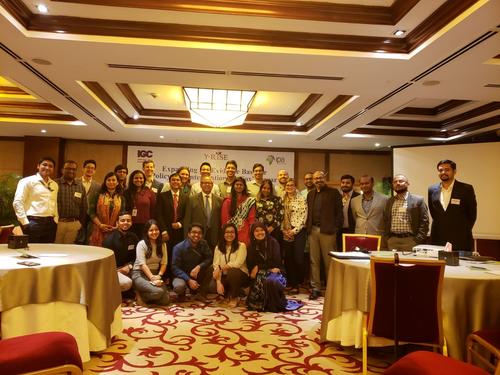
On December 3rd, 2019 the International Growth Center (IGC), the Program on Refugees, Forced Displacement and Humanitarian Responses (PRFDHR) at Yale University and Innovations for Poverty Action (IPA) hosted Expanding the Evidence for Policy and Interventions in Cox’s Bazar, a day-long policy workshop discussing research findings on the influx of Rohingya refugees in Cox’s Bazar and how evidence can inform programming and policy.
The workshop was attended by over 90 policymakers and practitioners in Dhaka, Bangladesh. Researchers presented results from the Cox’s Bazar Panel Survey (CBPS), a comprehensive dataset tracking social, economic, and health outcomes among 5,020 refugee and host community households in the Cox’s Bazar and Bandaran districts.
The opening session began the panel with statements from Imran Matin (IGC and BRAC), Mushfiq Mobarak (Yale University, J-PAL and IPA), Heidi McAnnally-Linz (IPA), and Steven Corliss (UNHCR) on the importance of high-quality data and evidence in the Rohingya response and responses to forced displacement worldwide. The day continued with four topic-specific technical panels, anchored by research presentations by local and international researchers. In the first technical session on Trauma and Mental Health, Paula López Peña (Yale University) presented “Trauma and Mental Health among Refugees and Hosts in Cox’s Bazar.” López Peña was joined by Atonu Rabbani (Dhaka University), Ashique Selim (Psychological Health and Wellness Clinic) and Uzzal Roy (Sajida Foundation) for the panel discussion.
The second technical session on Early Child Development (ECD) featured presentations from Jena Hamadani (International Centre for Diarrheal Disease Research, Bangladesh) on “The Journey Towards Scaling Up of ECD Activities in Bangladesh” and Asadul Islam (Monash University) on “ECD in the Humanitarian Context: Experience from BRAC’s Humanitarian Play Labs (HPL).” Erum Mariam (BRAC University) and Roxana Khanom (Save the Children) engaged in a discussion with Hamadani and Islam. In the third technical session on Gender and Adolescence, Jennifer Muz (George Washington University) and Muhammad Ala Uddin (Chittagong University) presented “The Lives They Lead: Exploring the Capabilities of the Bangladeshi and Rohingya Adolescents in Cox’s Bazar.” The other members of the panel were Sabina F. Rashid (J.P.G. School of Public Health, BRAC University), Humaira Farhanaz (United Nations Population Fund), and Maheen Sultan (BRAC Institute of Governance and Development).
The final technical session on Labor and the Local Economy began with a presentation by C. Austin Davis (Yale and American University) on “Prices, Assets, and Work: Pre and Post-Displacement Changes for Hosts and Refugees.” The remainder of the panel on Consumption and Food Security was comprised of K. A. M. Morshed (BRAC), Aline d’Ormesson (World Food Programme), and Md Mizanur Rahman (Refugee Relief and Repatriation Commission, Government of Bangladesh). The day concluded with a closing session, from Mushfiq Mobarak, Sultan Hafeez Rahman (Bangladesh Institute of Research and Governance), Robert Chatterton Dickson (British High Commissioner to Bangladesh), and M. A. Mannan MP (Minister of Planning, Government of Bangladesh).
CBPS is the result of a partnership between the Yale MacMillan Center Program on Refugees, Forced Displacement and Humanitarian Responses (PRFDHR), the Gender & Adolescence: Global Evidence (GAGE) program, and the Poverty and Equity Global Practice of the World Bank and the State and Peacebuilding Fund (SPF) administered by the World Bank. Data collection for the CBPS was implemented by IPA Bangladesh over the period March-August 2019.
